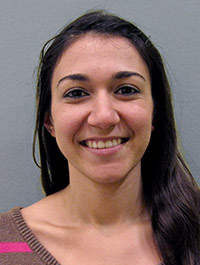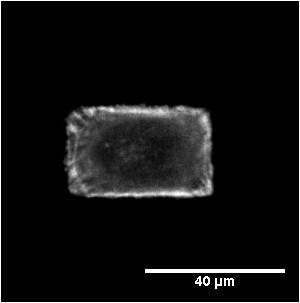Cypriot BioE student receives HHMI award
Elena Kassianidou left her home country of Cyprus for the United States seven years ago, following her older sister to California. After getting her degree in biomechanical engineering from Stanford, she came to Berkeley for graduate school, impressed by both its academic rigor and its personalities.

Elena Kassianidou
Now pursuing a Ph.D. in bioengineering, she recently became the first student from Cyprus — and the first Berkeley-UCSF bioengineering student — to be awarded the Howard Hughes Medical Institute’s (HHMI) prestigious International Predoctoral Fellowship.
Kassianidou’s work in professor Sanjay Kumar’s lab centers on identifying the parameters that contribute to stress-fiber tension generation in human glioblastoma cells, the most common and aggressive form of brain cancer.
Her latest success is the result of years of hard work, both here and in Cyprus. Kassianidou’s parents, both of whom studied in England, impressed the importance of education upon their children from a young age. Her mom teaches high-school math, and her dad, who started out in aeronautical engineering, runs a company that makes water pumps to help meet the country’s pressing need for fresh water.
“They really tried to encourage us to spread our wings and go away, which is not very typical for a Cypriot family,” Kassianidou said. Youth who do leave home for school tend to decamp to England. “It’s very unusual for students to go all the way to the U.S.”
To prepare for her studies abroad, she enrolled at a private English school where she took all the science classes she could. “I knew I liked biology, physics and math, but I couldn’t decide which one I wanted to study,” she said. With college on the horizon, her parents encouraged her to apply for a Fulbright scholarship, which she received, reducing the financial burden of her move to the States.
An undergraduate adviser encouraged her to consider biomechanical engineering. “I realized that it combined math, physics and biology,” she said. Berkeley’s program was a natural choice.

This cancer cell from a human brain is micropatterned to give researchers more control over its area and shape. By first micropatterning the cell and then ablating individual cell components, researchers gain a deeper understanding of the mechanical properties of cell components and how they contribute to physiological processes, such as cancer cell invasion.
Her current work employs a new combination of techniques — laser ablation and micropatterning — to help gain an understanding of why glioblastoma cells are so aggressive. This research could eventually be used to help prevent and treat a variety of human diseases, including brain cancer.
Qualifying for the HHMI fellowship is a competitive process: Kassianidou’s application was first vetted at Berkeley, then at the national level. Ultimately 42 students representing 19 countries were selected to receive the fellowship, which amounts to about $43,000 annually for three years.
The financial support will cover Kassianidou’s tuition and provide an additional stipend. It means she won’t have to teach in order to make ends meet, she said, which would detract from her time in the lab. “It gives me the freedom to concentrate on my research without having to worry about external factors.”
Kassianidou says it’s too early to forecast where her research will lead over the next three years. But the HHMI fellowship will help her get there—and beyond. She plans to continue her education as a postdoc, and, after that, perhaps teach at one of Cyprus’ two new universities. “I always try to make decisions that will allow me to come back home if I ever wanted to,” she said. “Cyprus is my home.”